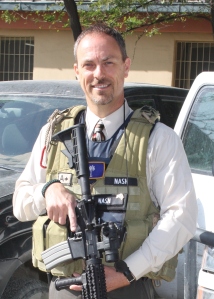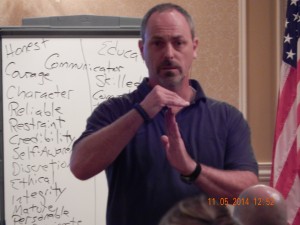
The character quality of the month is Sensitivity, which the Character Training Institute defines as:
Perceiving the true attitudes and emotions of those around me.
Think about it from a street survival perspective for a minute. Perceiving the true attitudes and emotions of a criminal suspect can be the difference in life or death. We call it “street savvy” or “street sense,” but the character quality of sensitivity can give you more protection on the street than your ballistic vest…!
(Which I am grateful to have when I am roaming around the streets of Afghanistan…)
This next series of posts will be a bit different for the Police Dynamics site. I was invited by Pastor Chuck Baldwin to speak at Crossroad Baptist Church during their God and Country Service just prior to the 2006 elections. My topic was the Biblical Foundations of American Government. The whole message went about 56 minutes, but I am going to break it down into shorter clips to be posted on the blog.
During the first portion of the presentation, I spoke about the importance and true meaning of the oath of office taken by an elected official. George Washington said: “…where is the security for property, for reputation, for life, if the sense of religious obligation desert the oaths…?” I believe he was right…
Click here to view the entire message on the Foundations of American Government.
Here is Pastor Baldwin’s rather lengthy introduction of me as the speaker for anyone who is interested…
The Latin root for the word integrity is integritas – which means wholeness and completeness. Here, I use the opportunity of visiting the ancient Roman city of Jerash in Amman, Jordan to tell another story about the centurion. In the Roman military tradition, the soldiers would line up for inspection and as the centurion approached each man, the soldier would bang his breastplate with his fist and shout, “Integritas!” which meant, “I am whole. I am complete. And I am prepared for battle…!”
I was first exposed to this history in a speech by General Charles Krulak, then commandant of the US Marine Corps.
 “… And never suppose that in any possible situation, or under any circumstances, it is best for you to do a dishonorable thing, however slightly so it may appear to you… From the practice of the purest virtue, you may be assured you will derive the most sublime comforts in every moment of life, and in the moment of death.”
“… And never suppose that in any possible situation, or under any circumstances, it is best for you to do a dishonorable thing, however slightly so it may appear to you… From the practice of the purest virtue, you may be assured you will derive the most sublime comforts in every moment of life, and in the moment of death.”
–Thomas Jefferson, letter to Peter Carr, 1785
You may be familiar with the Peter Principle that states,”In a hierarchy every employee tends to rise to his level of incompetence.” First espoused by Dr. Laurence Peter, this principle essentially means that, within an organizational structure, employees tend to be promoted as long as they perform competently. Sooner or later, they are promoted to their highest “level of incompetence” where they are no longer capable of performing well. And here they tend to remain stuck.
The Peter Principle I talk about here is different, however. This Peter Principle involves the Apostle Peter who was one of Jesus’ disciples who lived at Capernaum where I filmed The Centurion video. Peter was a fisherman on the Sea of Galilee and being there gave me an opportunity to talk about this important leadership principle, which I have to credit to my Chief of Staff, Barney Barnes (every Sheriff needs a Barney)…
You can read more important leadership principles from Chief Barnes at his blogsite: www.eyeofeagle.wordpress.com.
For those of you interested in seeing more of the Sea of Galilee, plus our wonderful meal of St. Peter’s fish, here are a couple of additional videos. Also featured are our guide and Biblical historian, David Dekker, and my travelling partner/cameraman, Gary Curry.
While we were at this restaurant, we had the opportunity to meet a famous Israeli general.
The stats helper monkeys at WordPress.com mulled over how this blog did in 2010, and here’s a high level summary of its overall blog health:

The Blog-Health-o-Meter™ reads Wow.
Crunchy numbers
The average container ship can carry about 4,500 containers. This blog was viewed about 14,000 times in 2010. If each view were a shipping container, your blog would have filled about 3 fully loaded ships.
In 2010, there were 119 new posts, not bad for the first year! There were 68 pictures uploaded, taking up a total of 142mb. That’s about 1 pictures per week.
The busiest day of the year was February 9th with 351 views. The most popular post that day was About Me.
Where did they come from?
The top referring sites in 2010 were policedynamicsmedia.com, mail.yahoo.com, facebook.com, policedynamics.com, and charactercounts.org.
Some visitors came searching, mostly for police training videos, sheriff ray nash, models of policing, police dynamics media, and proper exercise of authority.
Attractions in 2010
These are the posts and pages that got the most views in 2010.
About Me February 2010
10 comments
Training Videos February 2010
2 comments
Police Dynamics February 2010
1 comment
The Three Models of Policing / Leadership February 2010
6 comments
Contact Me February 2010
Thanks for a great first year!
Sheriff Ray
Many people think obedience means merely following instructions. In other words, someone in authority gives you an order or directive and you follow it. But what if your authority is “out from under authority?”
One of the criticisms we often face when teaching the principle of authority is that we are advocating blind obedience. Nothing could be further from the truth. We recognize that there are times when an authority has made a bad decision and it is proper to make an appeal….
 In order to make an appeal in court, there must be constitutional or procedural grounds. Otherwise there is no basis for the appeal. You cannot make an appeal simply because you disagree with the decision. In fact, the character test for obedience is often found in your willingness to follow directions that you disagree with.
In order to make an appeal in court, there must be constitutional or procedural grounds. Otherwise there is no basis for the appeal. You cannot make an appeal simply because you disagree with the decision. In fact, the character test for obedience is often found in your willingness to follow directions that you disagree with.
In a character-based organization, “grounds” fall into two categories: ethical violations or additional information. If your authority instructs you to violate a clearly defined ethical or legal standard, you have grounds to make an appeal. And to respectfully disobey if necessary.
More often… you have additional information that may influence your authority’s decision. In this case, you have grounds to bring this information to their attention. Examples could be pointing out a consequence of the decision that your supervisor may not have considered. Or, it could be informing them of a prior conflicting instruction that you had received from another supervisor. Or, maybe there is a well-established law or policy that prohibits that course of action.
In addition to having grounds for an appeal, you must also have “standing.” In other words, you must be in a lawful position to address the court. The same is true in making an appeal to an authority. Your standing is established through your reputation of good character. If you have been a faithful and loyal employee, then you have the right to make an appeal.
Sheriff Ray
While I was on vacation at Hacienda Tres Rios, I was reading the book 1776 by David McCollough.

It reminded me of the Authority Maxim which states that “all human authority is delegated authority” — it always flows from a higher source. So I climbed up a mangrove tree just to tell you about it…
Our Founders understood this Authority Maxim and wrote it into our founding documents such as the Declaration of Independence and the United States Constitution. Understanding this principle gives a professional police officer power to be more effective. By relying on positional authority instead of ego power, an officer can more effectively deal with difficult individuals who decide to challenge his authority. And “Because I said so, that’s why!” is NOT the professional response…
And just to prove that I did, in fact, climb a mangrove tree to film that last clip…
More video from Tres Rios: Dangerous Encounter with the Ferocious Mexican Coati
Merry CHRISTmas, everyone!
My family and I just returned from a fantastic vacation in Riviera Maya, Mexico (south of Cancun). We stayed at a beautiful resort called Hacienda Tres Rios (a place I highly recommend, by the way), which is surrounded by a nature preserve. There are 10 cenotes, or underground springs, that feed the three rivers of Tres Rios. I hiked to one of the cenotes to film this video clip where I talk about the importance of taming the tongue…
This tongue of ours get us into SO much trouble in law enforcement. As Dr. George Thompson, the founder of Verbal Judo, says, “When words rise readily to the lips, you are about to make the greatest speech that you will ever regret!”
Even the Bible has something to say about taming the tongue. In the book of James (3:9-11), it says:
With the tongue we praise our Lord and Father, and with it we curse human beings, who have been made in God’s likeness. Out of the same mouth come praise and cursing. My brothers and sisters, this should not be. Can both fresh water and salt water flow from the same spring?
At Cenote Hondo, I was reminded of the Bible’s reference to a spring producing both fresh and salt water. It is so important for us as professional law enforcement officers to control our tongue — and not only WHAT we say, but HOW we say it (which is what generates most of our citizen complaints). Remember, the Miranda warnings can apply to you, too: whatever YOU say can and will be used against you in court…
For anyone interested in Tres Rios, here is the promo video…
One of my former deputies wrote a research paper for his college course on ethics training. He included a section about his experiences with the Sheriff’s Office that I thought you might enjoy reading. His comments are about our philosophy regarding policies:
I had the privilege of working for a great sheriff in Dorchester County, SC. When I started working for Sheriff Ray Nash, I had just transfered from a much larger agency where everything was controlled by the policy manual and if you made a decision that a person of higher rank did not approve of, they would pour over the policy manual, which was in excess of three inches thick, to see if they could find something to punish you for “ethically.”
My Dorchester County policy manual (was so thin it) looked like a church bulletin — it was less than 20 pages long and in paperback. Sheriff Nash’s philosophy was to give his employees a few concrete moral lessons and then take those lessons out into the field and make our decisions not based on just a policy manual and the law, but on ethical principles. His belief was if you make ethically and morally correct decisions then those decisions will (also) be legally correct and will not violate policy. It is a philosophy I still carry with me today…
Richard Vaughn
I appreciate his understanding of this important topic. Policies are important and you have to have them in a high liability profession like law enforcement. But I also believe that it is impossible to write a policy for every conceivable situation an officer might find himself in. Some of us have attempted to do so and that’s why our policy manuals look like an encyclopedia volume!
I much prefer to focus on principles. Because I believe it is possible to articulate a much smaller number of ethical principles that will guide officers through a myriad of situations that they might find themselves in. That’s what Police Dynamics is — my effort to articulate these principles that govern our relationships and the profession of law enforcement.
Sheriff Ray



